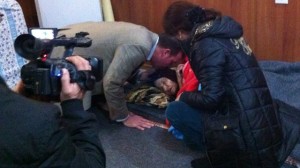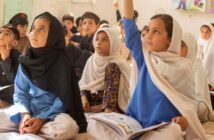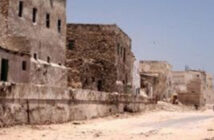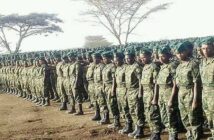
Image: Institute for Global Engagement/Cradle Fund
This past December, IGE’s Chris Seiple greets Sarah, a 95-year-old refugee at a shelter in Erbil. She died in March.
Source: Christianity Today
The American church has a key role in rescuing, restoring, and returning Christians and other religious minorities who have fled ISIS.
by Chris Seiple
‘Tell them that we Christians exist. We are the bridge between East and West,” said Felomain Nassar-Batshone, program manager, at International Orthodox Christian Charities, Amman, Jordan.
The story never changes. Whenever ISIS terrorists approach an Iraqi or Syrian village, Christians are given a fateful choice: They can stay and pay a tax to ISIS. They can convert to Islam. They can be martyred as Christians. Or, they flee.
We Americans would do well to remind ourselves that these Christians are the original church. They are in the cradle of Christianity. They are from the part of the world where the Good News was born and raised from the dead. These Christians also know that ISIS is but the latest attempt since the 1915 Armenian Genocide to rid the land of its resilient Christian community.
Last summer, they fled with nothing but the clothes on their back. A year later, that’s still all they have. Basim Alqassab, a Nineveh Plain Christian now in Amman, told me, “We live without salaries or hope of return to our homes. Our hearts feel fatigued and distressed with sadness and injustice.”
The only thing certain is their faith. In the last seven months, I have visited the region four times, traveling through northern Iraq, Lebanon, and Jordan. I have met hundreds of Christians living amidst terrible conditions. In each and every case—where it would be so easy to feel the absence of God—they declare themselves closer to God.
I met with the Jan and Yousef families in northern Amman, where the 14 members of their families live in a small apartment that they cannot afford with zero opportunity to return, work, or emigrate. They are Syrian Orthodox Christians from Mosul, Iraq, and they cannot provide for themselves. Yet, they said, “Everything on this planet will fade away. But Jesus Christ will never fail.”
In my visit to the small village of Anone, along the Iraqi-Turkish border, I met Fadia, who summed up the perspective of these Christians by saying, “My faith is stronger. We only have God now. Tell [Americans] I live every day with a smile and as if it is my last.”
This kind of transcendent trust is humbling. It also challenges each of us to work—spiritually, financially, and politically—toward a solution. I can never forget my short visit with Sarah, a 95-year-old Christian from Qaraqosh on the Nineveh Plain, just 30 miles from where I met her in an Erbil shelter. “I didn’t want to be here at this age. I want to be in my home,” she said. She went home—to God—in March.
A Simple and Complex Plan
Here are three things that we as Christians should pray for, so that safety will return to Christians and other religious minorities in the Middle East:
Rescue. The greatest need is cash assistance. Christians need cash for rent, medicine, and education in the absence of an opportunity to work.
Restore. There is a tremendous need to restore lives by restoring trust and addressing trauma. It is imperative that different ethnic and religious groups be in dialogue with each other about their common needs, both—now and if they should return to their homes, as trust is rebuilt. One way to restore trust is through education. Traumatized kids may learn from each other. In Marka, Jordan, Canon Andrew White has started a new school. Originally planned for 135 children, ages 5 to 14, the school now serves 250 refugee children. In Kurdistan, Iraq, we are working to create a new partnership that will holistically address trauma, especially gender-based violence.
Return. Returning to home and church would do the most to restore dignity, hope, and trust. It is also, at the moment, the least realistic—thus requiring the most prayer, and the most politics. The solution is at once simple and complex. The Christians and others will not return home unless they are assured of protection. Such a long-term solution cannot take place without the following elements:
- A Muslim-led defeat of ISIS;
- A Muslim-led and funded “Marshall Plan” to support economic recovery and job creation;
- Local military units to protect villages and towns;
- An international rapid reaction force that can assist these protection units within hours should they be attacked, thereby creating a safe haven at least in the Nineveh Plain region.
- The appointment of a US Special Envoy for religious minorities who can give specific and ongoing attention to these issues.
Why should America, and American Christians, support such a plan? There are two basic reasons.
First, to date, most discussions of strategy and policy have been anchored in the false choice between letting the Iraqis figure it out for themselves—as we continue to “degrade” but not “defeat” ISIS—and a full-scale reinvasion of Iraq. In the resulting vacuum between these two “choices,” the situation worsens, as the possibility of a pluralistic Iraq with mutually respecting ethnic and/or religious minorities lessens.
Second, the Nineveh Plain as a safe haven—per the example of Kurdistan in 1991—does several things at once, which are consistent with America’s values and interests. This kind of safe haven:
- Commits America to a specific and achievable plan that signals both resolve to our allies, and hope to all those who have been persecuted (not just Christians);
- Encourages religious minorities—especially Sunni, Christian, and Yazidi—to live together, which, in turn, would set a much needed example to the Middle East;
- Establishes a buffer between the Kurds and the Arabs, and between (in part) Iran and Syria; and
- Provides time to think about or come to sufficient consensus on the larger, interrelated issues of the Iranian nuclear deal, Iran’s influence in Iraq, Syria, and Lebanon, the Sunni-Shia divide, whether or not Iraq should continue as a state, and what a regional security structure might look like.
In other words, a safe haven establishes a different pattern as America convenes solutions from within the region as only America can. American combat troops, for example, will have to be a part of the rapid reaction force with American military advisers embedded with the protection units that they train. It is the only chance for trust to take root, and for Christians and other religious minorities to return and remain there.
Right now, the only leadership available for such thinking comes from Jordan’s King Abdullah II and the political leaders in Iraqi Kurdistan. America also needs to empower Jordan and Kurdistan as the two outposts of greater freedom in the region.
Why should Christians support such a solution? We are called to engage the world practically, with shrewdness and innocence (Matt. 10:16). We cannot throw up our hands and call the situation intractable—which is an insult to a sovereign God—nor should we do something just to “do something,” which can make the situation worse.
Nor can we only care about Christians, which is bad theology and bad practice. We are called to love all who bear the image of God—neighbor and enemy alike. Meanwhile, focusing only on Christians will alienate them from the rest of the population, creating tension when trust is needed between and among different ethnic and/or religious groups, while providing “propaganda” to the terrorists that the “Christian West” is on another “crusade.”
In short, something like the above plan is not only the right thing to do, both for America and Christians, but it is in everyone’s interest, especially those whom ISIS has persecuted (including Christians).
It’s that simple and that complex. In Isaiah 50:2, the Lord asks a simple question for another complex time: “Do I lack the strength to rescue you?”
We all know the answer, religiously, but not faithfully. The arm of the Lord is not too short (Num. 11:23), but too often we act like grasshoppers worshiping a grasshopper god (Num. 13:33), as if we expect his sovereignty to end with our salvation. That is wrong. Sometimes it is simply to show up and do what we can—faithful that God will work through states (Isa. 45) and societies—as he does what only he can.
Here are links to credible organizations working in the region:
- Assyrian Aid Society
- Dominican Sisters of St. Catherine of Siena
- Foundation for Relief and Reconciliation in the Middle East
- Heart4Lebanon
- International Orthodox Christian Charities
- Pre-Emptive Love Coalition
Chris Seiple is the president of the Institute for Global Engagement (IGE), and co-founder of IGE’s Cradle Fund, an effort to rescue, restore and return Christians and other ethnic and religious minorities to their homes.
[subscribe2]


